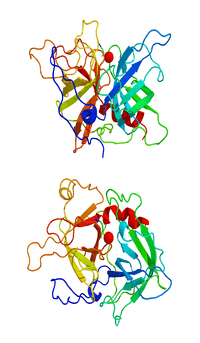Draculin

Draculin (named after Count Dracula) is a glycoprotein found in the saliva of vampire bats. It is composed of 411 amino acids, weighing about 88.5kDa. It functions as an anticoagulant, inhibiting coagulation factors IX (IXa) and X (Xa), thus keeping the blood of the bitten victim from clotting while the bat is drinking.
Draculin is a reversible, slow tight binding, noncompetitive inhibitor of FXa. It does not act on thrombin, trypsin or chymotrypsin and does not express fibrinolytic activity. The protein increases the lag phase as well as the height of the peak of thrombin generation when in plasma, leading to prolonged bleeding.
Daily salivation of vampire bats yields a saliva that progressively decreases in anticoagulant activity. However, there is no significant change in overall protein content during this time. After a 4-day period of rest, anticoagulant activity of the saliva is restored. In addition, purified native draculin, obtained from high- and low-activity saliva, shows significant differences in composition of the carbohydrate moiety, and glycosylation pattern. Furthermore, controlled chemical deglycosylation of native draculin progressively leads to complete loss of the biological activity, despite the conditions leaving the polypeptide backbone intact.
Draculin is currently being explored in medicine. The anticoagulant may be useful as a treatment for strokes and heart attacks. It may also be used as a blood thinner for the prevention of heart attacks. The protein has shown promise when treating ischemic strokes, which account for the majority of strokes. It is effective for up to 9 hours. However, since the activity depends heavily on the proper glycosylation of the polypeptide backbone, more research is needed before draculin can become a practical, widely available drug.
External links
- Fernandez AZ, Tablante A, Bartoli F, Beguin S, Hemker HC, Apitz-Castro R. Expression of biological activity of draculin, the anticoagulant factor from vampire bat saliva, is strictly dependent on the appropriate glycosylation of the native molecule. Biochim Biophys Acta 1998;1425:291-9. PMID 9795244.
- Apitz-Castro, R., et al. "Purification and partial characterization of draculin, the anticoagulant factor present in the saliva of vampire bats (Desmodus rotundus)." Thromb Haemost. 73.1 (1995): 94-100. Web. 17 Apr. 2013
- Fernandez, AZ. "Draculin, the anticoagulant factor in vampire bat saliva, is a tight-binding, noncompetitive inhibitor of activated factor X." Biochim Biophys Acta. 1434.1 (1999): 135-142.
- Hepler L. 2011. Researchers say bat could aid stroke victims. The Columbus Dispatch. Web, Accessed 17 Apr. 2013
- http://www.asknature.org/strategy/1848d3d4fdbdf17b001a72b2e7825c61